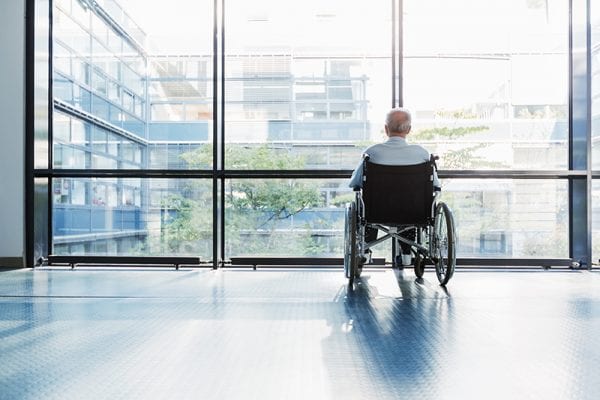Here are the tricks nursing facilities use to cover up potential evidence of wrongdoing.
According to the National Council On Aging, a staggering 5 million older adults are abused annually in the US. And while not all of those elders are harmed in a nursing home or assisted living facility setting, studies show that roughly 25 percent of nursing home abuse goes unreported.
Unfortunately, these statistics might not accurately reflect the number of senior citizens suffering abuse and neglect in nursing homes. That's because some nursing homes try to hide or destroy evidence to avoid accountability for the horrific things that happen in their facilities.
At The Law Office of George S. Johnson, LLC, we've witnessed firsthand how for-profit nursing homes think they can allow a cycle of elder abuse and neglect to continue without being held to account. Nobody deserves to be mistreated in a long-term care setting, but unless the responsible facility is punished financially through the civil justice system, there will be no actual change, and the cycle of abuse will continue.
Feeling helpless is normal if you suspect nursing home abuse or neglect, but you don't have to navigate these uncharted waters alone. To learn how an experienced Georgia nursing home abuse lawyer can help you, contact us today for a confidential case evaluation.
Ways nursing homes try to conceal evidence
Nursing homes and assisted living facilities often make outrageous claims to avoid liability in civil cases, so it shouldn't surprise anyone that some long-term care providers go to great lengths to cover up evidence supporting those claims. Here are some common tactics:
- Failing to report — If anyone at the facility witnesses or suspects neglect or abuse, or if a resident tells a staff member they are being harmed, the allegations should be reported immediately to administrators and the proper authorities to help prevent further suffering. Unfortunately, this doesn't always happen, especially when one staff member covers for another worker's abusive or neglectful behavior.
- Tampering with physical evidence — It's illegal, but that doesn't stop some staff members and administrators from doing it. For example, if your loved one was assaulted and bloodied by a staff member, clothing with blood stains could be destroyed or hidden. Likewise, some facilities will overwrite or delete footage that shows your loved one suffering a fall because they were left unattended. This is why you must act fast if you suspect something is wrong. An attorney can send a letter demanding the preservation of evidence.
- Telling blatant lies — When residents sustain injuries or develop medical conditions as a result of abuse or neglect, not all facilities are truthful. Using the example above, if your loved one fell and got hurt because no one was watching them, a negligent facility may claim your loved one was being observed, and the fall was an unavoidable accident.
- Fabricating records — Nursing facilities are required to fill out a lot of paperwork to document injuries, illnesses, medications, and special needs of residents. So, for instance, if your loved one developed bedsores because they weren't turned in bed often enough, an investigation might reveal that just because staff noted they turned the resident on schedule, that's not what actually happened.
Remember, you need evidence if you want a successful claim, but you also need experienced legal representation to help you gather and preserve that evidence before it's lost or destroyed by the facility in question.
What are the warning signs of nursing home negligence?
If you notice something isn't right with your loved one and suspect they are being mistreated or taken advantage of, don't ignore that instinct. Here are some common warning signs of nursing home abuse and neglect:
- Bruises and other unexplained physical injuries.
- Sudden weight loss.
- Changes in their mood. For example, your loved one suddenly seems depressed or is being more quiet than normal.
- New, unexplained medical conditions. For instance, if your loved one has developed bedsores, sepsis, or a urinary tract infection (UTI), it could be a sign of neglect.
- Visitation rights are restricted by the nursing facility for no apparent reason.
- Change in finances. In particular, unexplained charges, lost checks, missing cash, or misplaced credit cards. These can all indicate that your loved one is the victim of financial exploitation, the most common form of elder abuse.
- Changes in their Last Will & Testament. Again, this can be a red flag that your loved one is being financially exploited.
Remember, where there is smoke, there is usually fire. You should immediately take steps to protect your loved one if you suspect they are being mistreated in a nursing home or assisted living facility.
Don't let them sweep evidence under the rug. Contact a nursing home abuse attorney today.
When you know something isn't right, you should first ask to talk with nursing home management to report your concerns. Document the discussion by writing down when it happened, who you spoke with, and what they said.
Second, you should contact the Office of the State Long-Term Care Ombudsman. In Georgia, this state agency investigates allegations of nursing home negligence.
Next, if you suspect a crime, notify the police. Whether your loved one was physically assaulted or had money stolen from them by a staff member, elder abuse is a criminal offense.
Finally, contact a nursing home abuse lawyer. You may have a nursing home abuse case, but the only way to know for sure is to seek experienced legal advice from an attorney who can review your legal rights and potential legal options.
At The Law Office of George S. Johnson, LLC, we can independently investigate what happened to your loved one, find and preserve evidence, and hold those responsible accountable for their actions. Contact us today for a free case evaluation to learn more about how an experienced Georgia nursing home abuse lawyer can help you.


